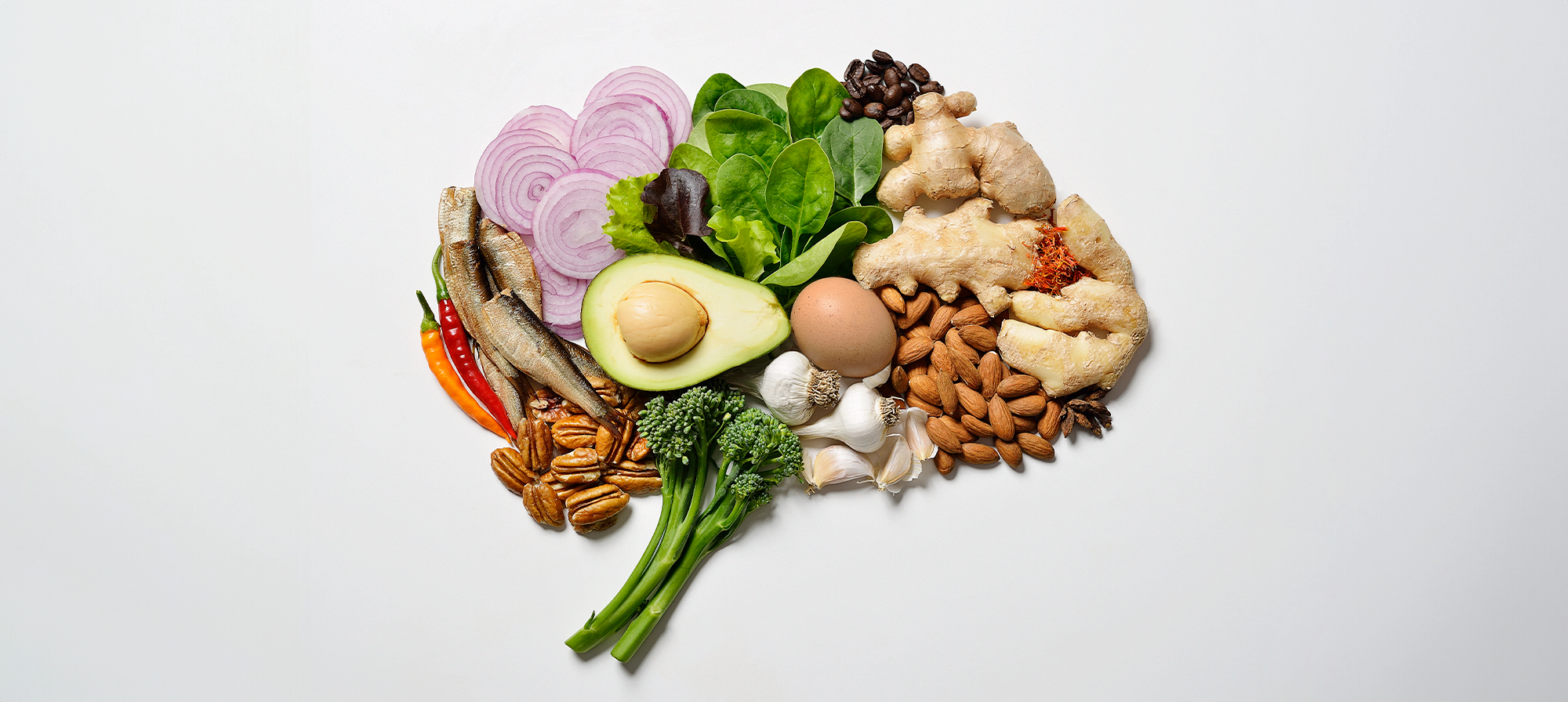With growing research showing a link between what you eat and your mental health, there is no better time to learn how food can affect your well-being.
The saying, “You are what you eat,” has been around for centuries. But it is more important now than ever before. There’s a growing body of research that suggests a direct link between the food we eat and our mental health.
A healthy diet can feed and fuel both your body and your brain. But a diet high in sugar and processed ingredients can harm your mood and brain function. The impact of food on mental health is real and affects your overall well-being.
Eating foods rich in nutrients, such as vitamins, minerals, and antioxidants each day can clearly impact brain function and mood. This highlights the value of your choices and how they affect your well-being. By sticking to a healthy, balanced diet with nutrient-dense foods, like fruits and veggies, you are giving your body and brain the food and energy they need to work at their best.
The brain-gut connection
If you've ever trusted your gut to make a choice or felt butterflies in your stomach, you were probably getting messages from a surprising place: your second brain. This brain is hidden in your digestive system and connects digestion, mood, health, and even thinking.
Scientists call this brain the enteric nervous system (ENS). The ENS is made up of 2 thin layers with more than 100 million nerve cells that go from your throat to your bottom.
Your brain affects your stomach and intestines, but the connection goes both ways. A troubled stomach can talk to the brain, the same way a troubled brain can speak to the stomach. So, if you have a stomachache, it could be because you are anxious, stressed, or depressed. On the other hand, the stomachache could be why you feel that way.
This 2-way link has a direct impact on your mental health.

Nutritional deficiencies and mental health
Your body and brain need a mix of vitamins, minerals, antioxidants, fats, carbs, water, and protein to work. Some of these nutrients are changed into hormones and neurotransmitters that help your body and mind stay balanced.
Simply getting enough calories helps give your brain the energy it needs to function properly. Without it, you might be more prone to feeling depressed, anxious, and irritable. Your mental focus can also take a hit.
When you eat low-nutrient foods (e.g., junk food), you might also feel more stressed and hyper-alert. This can boost cravings for more junk food to feel better fast. But this food isn't good for you. It lacks nutrients and can make it even harder to deal with stress. You’re more likely to become stuck in a toxic cycle of eating bad food and feeling more anxious…and then eating more bad food to try to feel better, and so on.
Although eating healthy, nutrient-rich foods may not fully prevent or ease depression or other mental health problems, it can help lessen some of the symptoms. On the other hand, those whose diets consist mainly of ultra-processed and/or fast foods, processed meat, refined grains, sweets, and fried foods, among others, have an increased risk for depression. Learn how a poor diet also boosts the risk for chronic diseases that affect your body.

The effects of a healthy diet on mental health
Researchers have studied different kinds of diets that may help support your mental health.
For example, experts have looked at the effects of the Mediterranean diet on those with depression. This is a diet rich in nutrient-dense foods that are minimally processed and highly plant-based. Although more research is needed, one study found that those on the Mediterranean diet saw a significant drop in depressive symptoms. Those in the control group had a much less dramatic effect.
The Mediterranean diet is not the only one that may support your mental health. The key is to eat nutrient-rich whole foods and to give your brain the energy it needs from different sources so it can work well. This includes carbohydrates and fats—but also protein to help your brain make the neurotransmitters that control mood—like feel-good serotonin and dopamine.
Learn about another diet that can help protect your brain from cognitive declines.

Tips for creating a food plan that supports mental health
Eating a wide range of whole foods will help you maintain a balanced diet and ensure you get the nutrients you need to support your mental health .
To do this, think about the following when building your meals:
- Carbohydrates. About a third of your food should include whole grains (whole grain bread, brown rice, etc.) and root vegetables (yams, turnips, beets, etc.). If you skimp on carbohydrates, you might trigger brain fog, depression, fatigue, and sluggishness.
- Fruits and vegetables. It’s generally recommended that you eat 5 portions of a variety of fruits and veggies every day. Fresh--or plain frozen, canned, dried, or juiced forms--without added sugar are all acceptable. Raw fruits and veggies have been found to reduce depressive symptoms and promote a more positive mood.
- Fish and omega-3 fats. Omega-3 fatty acids may help prevent heart disease. Oily fish such as salmon, trout, and sardines contain these fatty acids. Some studies suggest that omega-3s may also have a mood-stabilizing effect on short-term symptoms of bipolar disorders. They may also be used with antidepressants to lessen the symptoms of depression. It is wise to plan on eating 2-3 portions of fish per week.
- Saturated fat. Fat is essential to your diet, but keep in mind that too much can increase your cholesterol. Elevated cholesterol has been linked to an increased risk of anxiety, depression, and stress-related disorders. Try to eat less saturated fat, which is found in butter, lard, and fatty cuts of meat. Aim instead for healthier foods that contain unsaturated fats, like avocados, olive oil, or lean cuts of meat.
- Sugar. Free sugars are sugars added to foods and drinks or found naturally in things like honey, syrups, and fruit juices. Try to limit these free sugars. They are less healthy than the sugars found in whole fruits and vegetables, which have a lot of fiber.
One way to see if you’re keeping your intake at a healthy level is to check the sugar content on food labels. Aim for no more than 30g a day. Some findings suggest that lower sugar intake may also help the brain better process and retain information. - Salt. Too much salt has been shown to raise blood pressure in some people. This can lead to heart disease or even a stroke. Scientists also believe that salt may be linked to increases in stress.
In one study, a high level of sodium from salt not only increased stress hormone levels, but also triggered a response to environmental stress. It’s best to consume no more than 1,500 milligrams of sodium per day. Since most of your excess salt intake comes from packaged or prepared food, always check the nutrition facts label.
Keeping these tips in mind can help you protect both your physical and mental health. In addition to boosting your mood, eating well can increase your energy and lower your risk of heart disease, stroke, and diabetes.

Nutritional considerations for those over 65
As you age, your body changes and so do your nutritional needs. To stay physically and mentally healthy, it's important for people over 65 to focus on eating a diet rich in specific nutrients. A balanced diet includes lean proteins, fruits, vegetables, whole grains, and dairy.
Protein is important for keeping your muscles strong. Calcium and vitamin D are also crucial for keeping bones healthy and strong. Fiber is needed for digestive system health. In addition, staying hydrated is essential for both your energy and your mood. This is key for older adults who may not always feel thirsty. Eating healthy fats, like those found in fish, nuts, and olive oil is good for your heart health.
Having a healthy food plan that keeps these elements in mind has many clear benefits for mental health and more. It supports gut health, which in turn supports brain health. It also lowers the risks of long-term health conditions. A healthy diet can also improve concentration and attention.
Everyone is different, so it's a good idea to talk to your doctor to get personalized advice on the best foods for you to eat.
Ongoing research
Over the last few years, research on diet and mental health has received much attention. For a long time, doctors and psychologists didn't pay much attention to what researchers had to say about food and mental health. Now, more and more findings suggest that our food choices do impact our mental health. It's vital to start taking these findings seriously.
Eating healthy foods full of vitamins, minerals, and antioxidants can help your brain work better and improve your mental health. This suggests that what you eat matters. When you eat a diet rich in the proper nutrients, both your brain and your body have what they need to work their best.

Not a Silver&Fit® member? Learn more about everything the program has to offer, including more helpful healthy living tips like this, here on our website.
This information is not intended to take the place of regular medical care or advice. Please check with your doctor before using this information or beginning any self-care program. Images used for this article do not depict any members of the Silver&Fit program.
References
Bastiaanssen, T. F. S., Cussotto, S., Claesson, M. J., Clarke, G., Dinan, T. G., & Cryan, J. F. (2020). Gutted! Unraveling the Role of the Microbiome in Major Depressive Disorder. Harvard Review of Psychiatry, 28(1), 26–39. https://doi.org/10.1097/hrp.0000000000000243
Bizzozero-Peroni, B., Martínez-Vizcaíno, V., Fernández-Rodríguez, R., Jiménez-López, E., Núñez de Arenas-Arroyo, S., Saz-Lara, A., Díaz-Goñi, V., & Mesas, A. E. (2024). The impact of the Mediterranean diet on alleviating depressive symptoms in adults: A systematic review and meta-analysis of randomized controlled trials. Nutrition Reviews, nuad176. Advance online publication. https://doi.org/10.1093/nutrit/nuad176
Cherian, L., Wang, Y., Fakuda, K., Leurgans, S., Aggarwal, N., & Morris, M. (2019). Mediterranean-Dash Intervention for Neurodegenerative Delay (MIND) Diet Slows Cognitive Decline After Stroke. The journal of prevention of Alzheimer's disease, 6(4), 267–273. https://doi.org/10.14283/jpad.2019.28
Clay, R. A. (n.d.). The link between food and mental health. APA. https://www.apa.org/monitor/2017/09/food-mental-health
Cleveland Clinic. (n.d.). The gut-brain connection. https://my.clevelandclinic.org/health/body/the-gut-brain-connection
Cleveland Clinic. (2023, July 6). Nutrition for older adults: Why eating well matters as you age. https://health.clevelandclinic.org/how-to-age-better-by-eating-more-healthfully
DeAngelis, T. (2023, June 1). That salad isn’t just good for nutrition—it may help stave off depression. American Psychological Association. https://www.apa.org/monitor/2023/06/nutrition-for-mental-health-depression
Firth, J., Gangwisch, J. E., Borsini, A., Wootton, R. E., & Mayer, E. A. (2020). Food and mood: How do diet and nutrition affect mental wellbeing? BMJ, m2382. https://www.bmj.com/content/369/bmj.m2382
Grajek, M., Krupa-Kotara, K., Białek-Dratwa, A., Sobczyk, K., Grot, M., Kowalski, O., & Staśkiewicz, W. (2022). Nutrition and mental health: A review of current knowledge about the impact of diet on mental health. Frontiers in Nutrition, 9. https://doi.org/10.3389/fnut.2022.943998
Gundersen Health System. (2024, March 19). The link between nutrition and your mental health. https://www.gundersenhealth.org/health-wellness/eat-move/the-link-between-nutrition-and-your-mental-health
Jacka, F. N., Cherbuin, N., Anstey, K. J., Sachdev, P., & Butterworth, P. (2015). Western diet is associated with a smaller hippocampus: A longitudinal investigation. BMC Medicine, 13(1). https://doi.org/10.1186/s12916-015-0461-x
John Hopkins Medicine. (2024, January 24). The brain-gut connection. https://www.hopkinsmedicine.org/health/wellness-and-prevention/the-brain-gut-connection
Kaplan, B.J. & Rucklidge, J.J. (2021). Better Brain Diet: The New Science of Treating, Anxiety, Depression, ADHD, and Other Mental Health Disorders With Nutrition. Vermilion.
Li, Y., Lv, M., Wei, Y., Sun, L., Zhang, J., Zhang, H., & Li, B. (2017). Dietary patterns and depression risk: A meta-analysis. Psychiatry Research, 253, 373–382. https://doi.org/10.1016/j.psychres.2017.04.020
Mass General Brigham McLean. (n.d.). Diet and mental health: How nutrition shapes your well-being. https://www.mcleanhospital.org/essential/nutrition
MedlinePlus. (n.d.). Nutrition for older adults. https://medlineplus.gov/nutritionforolderadults.html
Mental Health America. (n.d.) Omega-3s. https://www.mhanational.org/omega-3s
National Health Service. (2024, April 15) 8 tips for healthy eating. https://www.nhs.uk/live-well/eat-well/how-to-eat-a-balanced-diet/eight-tips-for-healthy-eating/
National Health Service. (2023, May 26). Sugar: The facts. https://www.nhs.uk/live-well/eat-well/food-types/how-does-sugar-in-our-diet-affect-our-health/
Selhub, E., MD. (2022, September 18). Nutritional psychiatry: Your brain on food. Harvard Health. https://www.health.harvard.edu/blog/nutritional-psychiatry-your-brain-on-food-201511168626
The University of Edinburgh. (2022, November 16). An excess of salty food seasons the body with stress. https://www.ed.ac.uk/news/2022/an-excess-of-salty-food-seasons-the-body-with-stre
Zielińska M, Łuszczki E, Dereń K. (2023, May 23). Dietary nutrient deficiencies and risk of depression (Review Article 2018-2023). Nutrients, 15(11): 2433. https://doi.org/10.3390/nu15112433.
This article was written by Kimberley Reynolds, edited by Gail Olson, and clinically reviewed by Elizabeth Thompson, MPH, RDN, on July 22, 2024.





